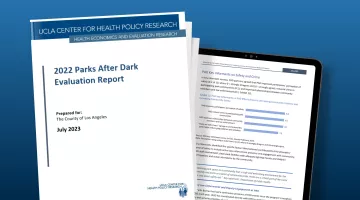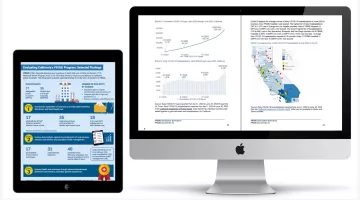Menu - Health Economics and Evaluation Research (HEER) Program
- Home
- Our Work
- Health Economics and Evaluation Research
- About HEER
About HEER
The Health Economics and Evaluation Research (HEER) team conducts research on various aspects of the health care delivery system including evaluations of statewide or organization-specific demonstrations and programs, the impact of personal and public health interventions on costs and cost-effectiveness, and the impact of health insurance coverage, quality of care, patient outcomes, or expenditures, among other topics.
HEER staff have lent their expertise to a broad range of organizations and initiatives, including the Health Resources and Services Administration, California Department of Health Care Services, the California Department of Public Health, the Los Angeles County Department of Public Health, the California Department of Housing and Community Development, the California Health Benefits Review Program, as well as to California’s statewide health care reform effort.
Our Work
The HEER Program specializes in the evaluation of complex and large-scale interventions, including major California demonstration programs such as Whole Person Care (WPC), Public Hospital Redesign and Incentives in Medi-Cal (PRIME), California Health Home Program (HHP), and Housing for a Healthy California (HHC). HEER researchers have extensive expertise in conducting different types of evaluations, including:
- Formative and summative evaluations
- Implementation and process evaluations
- Qualitative, quantitative, and mixed methods evaluations
- Impact evaluations
- Systematic reviews
HEER researchers have significant experience creating predictive models that help policymakers, advocates, program experts, and others plan for change.
The HEER Program is known for the California Simulation of Insurance Markets (CalSIM), a microsimulation developed by the UCLA Center for Health Policy Research and the UC Berkeley Labor Center that uses a range of official data sources to estimate the impact of the Affordable Care Act on California on population coverage.
Program staff have also developed models to assess the consequences of high disease burden and cost of illness studies to help local and state agencies plan for health care interventions that target specific conditions or populations. These studies have included assessment of the burden of disease in LA County, supply of and demand for dental anesthesia and long-term supportive services, and cost of maternal health conditions to the Medicaid program among others.
HEER Program staff have examined utilization, costs, and cost-effectiveness of personal and public health interventions for a broad range of public and private organizations as well as government initiatives, including California’s health care reform effort. Past projects include:
- Estimated Medi-Cal payments for both overall service use and for specific services to be used in comparisons of expenditures between intervention and comparison populations.
- Out-of-pocket expenditures among insured Californians as a percentage of total family income.
- Access to medical services among injured workers through California’s workers’ compensation system.
- Changes in use of high-cost services, such as inpatient hospitalizations and emergency room visits, in response provision of care coordination or care management services.
Our Expertise
The HEER Program brings rigorous statistical expertise to its investigations. HEER researchers experience with numerous national- and state-level databases for modeling personal behavior and expenditures, as well as conducting small-area estimation:
- Medicare and Medi-Cal enrollment and claims data
- Healthcare Cost and Utilization Project (HCUP) hospital financial, utilization, and discharge data
- California Department of Health Care Access and Information (HCAI) hospital financial reports and patient discharge data
- California Health Interview Survey (CHIS)
- The Medical Expenditure Panel Survey (MEPS)
- Current Population Survey (CPS)
- Behavioral Risk Factor Surveillance System (BRFSS)
- Medicare Beneficiary Survey File (MBSF)
In addition to standard econometric modeling, HEER researchers are experienced in conducting small-area estimation and working with geo-coded data. HEER has a secure data access center with the ability to house protected health information (PHI) in a HIPAA-compliant manner.



















